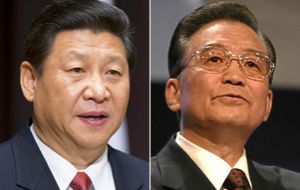MercoPress. South Atlantic News Agency
Report reveals overseas accounts in tax havens of the Chinese communist elite
 Names of close relatives from President Xi Jinping and former Premier Wen Jiabao appear in the British Virgin Islands
Names of close relatives from President Xi Jinping and former Premier Wen Jiabao appear in the British Virgin Islands Close relatives of China’s top leaders have held secretive offshore companies in tax havens that helped shroud the Communist elite’s wealth, a leaked cache of documents reveals. As the report was released several western newspapers, news agencies and websites, some of them with the mandarin version, were hacked in China.
The confidential files include details of a real estate company co-owned by current President Xi Jinping’s brother-in-law and British Virgin Islands companies set up by former Premier Wen Jiabao’s son and also by his son-in-law.
Nearly 22,000 offshore clients with addresses in mainland China and Hong Kong appear in the files obtained by the International Consortium of Investigative Journalists. Among them are some of China’s most powerful men and women — including at least 15 of China’s richest, members of the National People’s Congress and executives from state-owned companies entangled in corruption scandals.
PricewaterhouseCoopers, UBS and other Western banks and accounting firms play a key role as middlemen in helping Chinese clients set up trusts and companies in the British Virgin Islands, Samoa and other offshore centers usually associated with hidden wealth, the records show. For instance, Swiss financial giant Credit Suisse helped Wen Jiabao’s son create his BVI company while his father was leading the country.
The files come from two offshore firms — Singapore-based Portcullis TrustNet and BVI-based Commonwealth Trust Limited — that help clients create offshore companies, trusts and bank accounts. They are part of a cache of 2.5 million leaked files that ICIJ has sifted through with help from more than 50 reporting partners in Europe, North America, Asia and other regions.
Since last April, ICIJ’s stories have triggered official inquiries, high profile resignations and policy changes around the world. Until now, the details on China and Hong Kong had not been disclosed.
The data illustrates the outsized dependency of the world’s second largest economy on tiny islands thousands of miles away. As the country has moved from an insular communist system to a socialist/capitalist hybrid, China has become a leading market for offshore havens that peddle secrecy, tax shelters and streamlined international deal making.
Every corner of China’s economy, from oil to green energy and from mining to arms trading, appears in the ICIJ data.
Chinese officials aren’t required to disclose their assets publicly and until now citizens have remained largely in the dark about the parallel economy that can allow the powerful and well-connected to avoid taxes and keep their dealings secret. By some estimates, between $1 trillion and $4 trillion in untraced assets have left the country since 2000. The whole report can be seen at the International Consortium of Investigative Journalists, website.




Top Comments
Disclaimer & comment rules-

-

-

Read all commentsAnd this is a surprise?
Jan 23rd, 2014 - 03:57 pm 0sadly, no...
Jan 23rd, 2014 - 06:50 pm 0they do say,
Jan 23rd, 2014 - 07:07 pm 0that a balloon can only get so big,
before it either bursts,
or some, steal the air and move it to overseas balloons.
so they say,
china may not be growing as fast as they make out ..
Commenting for this story is now closed.
If you have a Facebook account, become a fan and comment on our Facebook Page!